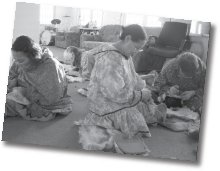Ideas for Murals
This could be an interesting and challenging project for an arts and literacy
program. As part of the literacy component, the group could work on an oral
history project. First the class completes the steps of the research phase of the
project – watching videos, reading books and articles, listening to oral history
recordings or interviewing Elders. Then they write about their theme in a variety
of ways. They could share the information they researched with the community by
expressing themselves artistically in the form of a mural.
- Find a place in the community where many people can enjoy the mural.
Get support for the mural project from the municipal government (the Hamlet
or City).
- Discuss among the group members what type of visual images you want to
use. What images would best express an important message you got from
your oral history research that you would like to pass on to others?
- Each group member could draw or paint your own ideas for the mural on art
paper. This would be a mock-up or a model in much smaller form of the final
mural.
- Everyone could also write a composition or prepare a speech to explain why
you chose these images.
- Share the drawings and compositions with the other group members.
- Discuss ideas for the group mural, choosing images that you like from
the individual paintings. Allow plenty of time to reach agreement on the
composition of your mural. Continue with other work until the group reaches
a consensus.
- Make a plan. Discuss how you will go ahead with the mural:
- Who does what jobs?
- What supplies will be needed?
- How long will it take to complete each stage of the mural?
Post the work plan on the wall so each of you knows your role.
- When the mural is finished, invite the community to an opening event! Ask
the Hamlet or City to sponsor a feast and square dance or ask for donations of
food. Display the group members’ compositions as well. Group members can
be available to talk to people about their oral history project and the mural.

On language isolates (languages that are unique – not related to any other known language)...
“They are the archaeology of civilization, full of wisdom, legend and beauty, messages
from the Earth’s own time-travellers.”
Simon Jenkins
From Spoken Here by Mark Abley, published by Random House Canada, 2003

